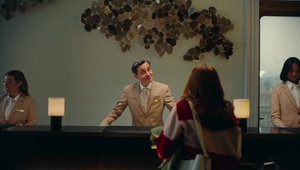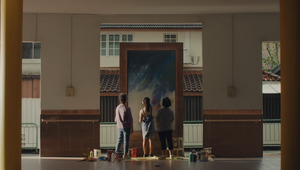
Thinking in Sound: Why Music Is Like Oxygen for Emika Kusunoki

Emika Kusunoki started in the radio industry in Tokyo, spending ten years producing multiple radio shows.
She has many experiences in music including a successful negotiation with Sir Paul McCartney himself for him to appear via phone on a show she produced. Since three years ago, Emika has played an essential role as a music supervisor at Tracks & Fields Tokyo.
LBB> When you’re working on a new brief or project, what’s your typical starting point? How do you break it down and how do you like to generate your ideas or response?
Emika> I try to figure out what kind of music the client is looking for. As an example, if a client specifies 'pop' as the genre, I need to know what kind of pop it should be. It might be '80s pop or the latest pop. I ask the client for more details for inspiration. Then, I research some songs as references to make the image more obvious.
LBB> Music and sound are in some ways the most collaborative and interactive forms of creativity - what are your thoughts on this?
Emika> Even if a person doesn't like the music, they might like it if the sound has changed. I had an experience in which a client didn't like our demo at first, but then he loved the exact same music after changing the sound!
LBB> Do you prefer to work solo or with a gang - and what are some of your most memorable professional collaborations?
Emika> I like working solo basically, but I am aware that the power of creativity comes out when people work together and give each other ideas and feedback. So, every time I have a project I ask my colleagues if they have music ideas.
It's really important to find several options before starting music production. My colleagues may have another idea of mine so we find different ways with the team.
The ZOZO NEXT film is memorable: it was for the promotion of the ZOZO NEXT exhibition of several prototype projects at CREATIVE INDUSTRIES EXPO at SXSW 2022.
The concept film is an essay about how fashion could evolve in the future. The year is 204X - a world where XR technology, smart fabrics, and other technologies that would be called “advanced technology” in 2022 are integrated into our daily lives.
Since it is a film that lasts over five minutes, we discussed structuring the music into three chapters or parts.
It was super helpful to be able to work with the full length offline at that time. We could truly understand what moods were needed. With the composer we started to create a composition within the structure: it began with a minimalistic ambient atmosphere, to gradually grow in a crescendo of elements and a more upbeat sound, to finally then we ended up adding vocals to the last part.
Initially, the client aimed to add the overall narration but didn't as they thought the music led the story really well. As well as the client, we were pleased with the results of this Sci-Fi project.
LBB> What’s the most satisfying part of your job and why?
Emika> I like listening to music and that's the most satisfying part. If there is no music at work I might go crazy. I just love music. Music is air for me, that's the reason.
LBB> As the advertising industry changes, how do you think the role of music and sound is changing with it?
Emika> Japan's advertising industry is quite unique: Japanese brands tend to spend most of their budgets on popular actors or models. In this case, the music budget is the remaining portion of the project budget. On the other hand, if the commercial doesn't feature a popular actor or model, most of the budget goes towards music. In the first case, the music research usually starts earlier, so there is time to find and discover the right music. In the latter case music research tends to start later, which means it doesn't leave us with enough or the 'ideal' time, but however the case might be, I am deeply convinced that beyond Japan's specific industry the role of music enhances the story contribuiting to the overall storytelling feeling of the film.
LBB> Who are your musical or audio heroes and why?
Emika> My audio hero of all time is Tatsuro Yamashita. He started his career as a music producer for advertisements. His most famous commercial song is 'Christmas Eve' used by a railway company. Although the song was written for a commercial in 1983, it has still been a long seller in Japan. He is a professional songwriter and also a professional sound creator. The best sound is what he sticks to. In addition to the best instrumentals, speakers, studio, mic, and other gear, he sticks with everything else that matters into music. It goes without saying that his sound is amazing.
LBB> And when it comes to your particular field, whether sound design or composing, are there any particular ideas or pioneers that you go back to frequently or who really influence your thinking about the work you do?
Emika> Yes, it's Tatsuro Yamashita again. I respect him a lot.
LBB> When you’re working on something that isn’t directly sound design or music (lets say going through client briefs or answering emails) - are you the sort of person who needs music and noise in the background or is that completely distracting to you? What are your thoughts on ‘background’ sound and music as you work?
Emika> I am answering this question by listening to music, it helps me to focus. I always listen to music whenever I do anything.
LBB> Do you have a collection of music/sounds and what shape does it take (are you a vinyl nerd, do you have hard drives full of random bird sounds, are you a hyper-organised spotify-er...)?
Emika> I have several playlists with different categories. A playlist to relax, a playlist to dance, a playlist to sleep and so on.
LBB> Outside of the music and sound world, what sort of art or topics really excite you and do you ever relate that back to music (e.g. history buffs who love music that can help you travel through time, gamers who love interactive sound design... I mean it really could be anything!!)
Emika> Watching dramas is fun for me and I appreciate it more if music affects the story well. I like dramas that have great music even if I don't like the story.
LBB> As we age, our ears change physically and our tastes evolve too, and life changes mean we don’t get to engage in our passions in the same intensity as in our youth - how has your relationship with sound and music changed over the years?
Emika> I experience physical changes every year, but music never gets old. Music always stays with me in my memories. My memory is vividly evoked every time I tune into a memorable song. When I want to feel young, I listen to the song I listened to in my youth, then I feel young again.















